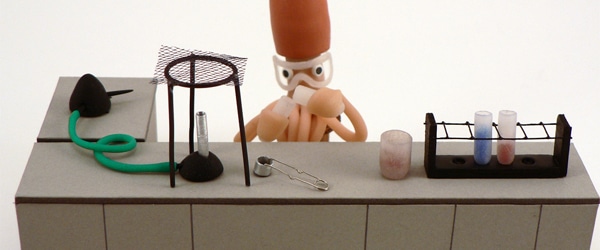There are so many unspoken rules to working in a lab! It’s unnerving what will cause frayed nerves to snap, people not to trust you and a good relationship to turn sour. Here are some of the rules I’ve learned. Feel free to add more in the comments section below.
1. Thou Shalt Not Touch
You should never, and I mean EVER use someone else’s enzymes, primers, liquid media or any other solutions, particularly those that are sensitive to contamination, without permission! And even if you do get permission, then always aliquot what you need into a separate container in a sterile hood.Otherwise you risk contamination and you don’t want to be responsible for anyone else experiment going wrong (or getting blamed for it anyway!). If you have separate pipettes and pipette tips or other equipment, the same rules apply here too!
2. Do Unto Others As You Would Have Them Do Unto You
Are you making up stock solutions? It’s good manners to ask everyone if they would like you to make some for them. Or if you are ordering the weighing scales you’ve finally convinced your boss you need to replace the old USSR one in the lab, ask everyone who is about if they need anything and stick it on the list. They’ll likely pay it back in kind. You give a little, you get a little.
3. Thou Shalt Admit to Thy Mistakes
Did you accidentally contaminate the Taq? Don’t worry! We all make mistakes, the important thing is learning to admit when you do. It might seem easier just to hide it away and hope for the best, but if you get caught out later the repercussions could be huge, especially if you ruined someone else’s work or even risked other people’s safety. If you own up straight away you’ll likely not even get in trouble, instead your colleagues will appreciate your honesty. That said you should make a conscious effort to learn from your mistakes!
4. Thou Shalt Help The Sick
We all get sick, especially coming up to super important your-life-depends-on-it dates. If you get an email from a sick coworker asking you to do a small favor; check their mice, split their cells, etc. try your best to do so or ask someone else. It might just bit a little extra work for you but it could save someone else hours, days or even weeks of additional work. Plus it’s a sign of trust – you wouldn’t ask someone you didn’t trust to maintain your cells? See it as praise!
5. Cleanliness Is Next To Godliness
You may not be the tidiest person in the lab but learn to be! Good rules to live by are: no dirty dishware in the sink; don’t leave cupboards/fridges/bottles/cell culture room doors/freezers open; and whatever you do don’t leave the liquid nitrogen container improperly sealed. A moment of forgetfulness (or laziness) could ruin someone else’s work and there is nothing more terrifying than a researcher who has had they hard work ruined by someone else. You have been warned!
6. Be Nice!
This is really a rule for any place you work, but especially in the lab as you will probably be spending more time there than a typical 9-5 job. Avoid gossiping/backbiting about co-workers or your boss. It’ll probably come back to haunt you and focusing on the negative is draining. You might feel temporarily relieved but you’re a good-natured person so you’ll probably feel guilty about it later. Keep people’s trust and leave the fault-finding to troubleshooting experiments
7. Take Ye Pride In Your Work
Keep your lab book well-organized. Have a folder for Materials and Methods and one for Protocols. If you leave your lab and someone is given responsibility to continue your work but you’ve not made it absolutely foolproof, they’ll probably have to start again and you might loose authorship or that glowing reference you were hoping for.
If you’re not sure how to keep a nice lab book, ask to see your coworkers books for ideas. You’ll quickly see who is organized and whose book looks like it was forgotten in a drawer for months on end. Alternatively, check out our previous article on how to keep your lab book organized.
Just remember, your work is what you leave behind, your legacy. So buy some nice pens, a ruler, post-it notes and highlighters and get moving.
8. Do Not Be Content With Showing Friendship In Words Alone
Lab life can be hard, especially with long hours and even weekend work. To make it less of a chore learn a little about those with whom you work. Don’t just say “hello” with increasing half-heartedness until you just avoid eye contact all together. Take some time to ask them about their work, their interests, their hopes and dreams and how they got there. Working with friends is far better than strangers. This even applies to the PI, although take it slow on this one. Bring in cookies and maybe ask coworkers to join you and your friends at the movies. I would also highly recommend going to lab social events, even if you’re sleepy! If you say no too many times, people will stop asking.
9. Know The Hierarchy
At the beginning, you’ll be asking everyone for help. You’re going to be a very annoying person for the first while! And that’s fine, everyone else has been there. But something people don’t realize is the importance of hierarchy. This is especially true if you work in a very big lab.
You’ll probably be assigned to a Post Doc or Senior Research Assistant who is leading the project you’re working on. If you have a problem, ask this person. If you’re new and especially if you’re on the lower end of the hierarchy, be careful taking the initiative and being too much of an eager beaver out to impress. Sometimes it’ll come back to bite you.
For example, you needed a recipe so you asked someone if they knew it. They tell you theirs and you go about your merry way. A few weeks later you find out that the recipe your supervisor uses is different. Uh-oh! Also, if you go around telling people a protocol doesn’t work, it doesn’t make your supervisor look good. Taking steps to discretely figure things out yourself is fine but just be careful about skipping your supervisor and going to other people or the PI about issues prematurely. Your actions reflect on your superiors, so help them look good! This is a much wiser aim than just looking out for number 1.
10. Know The Peeves
Everyone has their personal peeves. Some PIs refuse to buy filter tips. Some won’t buy premade media.Others will only let you buy everything premade and refuse to let people make their own stuff. You’ll learn what bugs people but while you’re learning be sure to notice what other people are doing. Try to be clean and tidy and not wasteful. Be considerate when using equipment. Ask if there are schedules for using any of it and be careful to reserve your space ahead of time and stick to within your slot. This is especially true if you are moving to a new lab. You’ll likely have your old way of doing things, but remember that you are the new guy now, so try to make an effort to fit in with your new lab’s routines.
Despite everything you do to avoid stepping on toes, it’ll happen! Just apologize and learn as you go.
Do you have any additional unspoken lab rules? Let us know in the comments!







